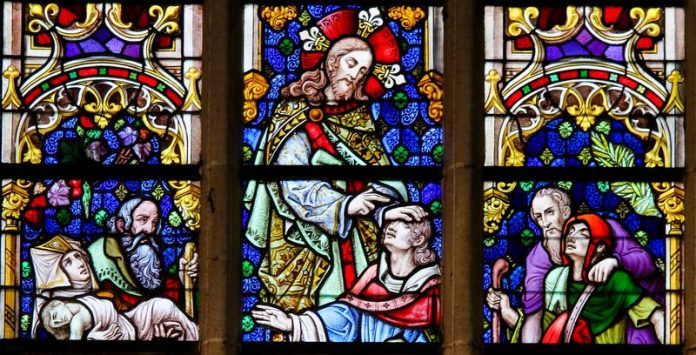
Reflections on Catholic Social Teaching and Catechesis in Our Day
TIMOTHY P. O’MALLEY
In catechetical textbooks the formal study of doctrine is often separated from immersion into the principles of Catholic social teaching. For example, in the United States Bishops’ framework for producing catechetical materials for high school students, a formalized encounter with Catholic social teaching is considered an elective within the curriculum. For this reason, many young people may only discover the social doctrine of the Church when it is affiliated with acts of service in the parish or the school. This separation of Catholic social doctrine from the kerygma of the Church is a serious problem. First, while Catholic social teaching is accessible to anyone of good will through the use of reason, the social teaching of the Church is itself part of divine revelation. Without divine revelation, Catholic social doctrine is separated from the encounter with Christ, becoming nothing more than abstract principles by which the Church seeks to order society. Catholic social teaching then becomes merely a set of moral obligations rather than the response and evidence of an encounter with the triune God.
Second, Catholic social teaching ensures that the salvation of the person is not reduced to an individual transformation alone. The evangelization brought about through good catechesis necessitates a renewal of society in Christ.
Lastly, if Catholic social teaching is only taught within the orbit of service, the deeper issues that cause poverty, immigration, migration, and abortion (to name several) are never acknowledged. The Church’s proclamation of the risen Lord entails not just service but a renewal of the social order in Christ.
Catholic social teaching and divine revelation
The General Directory for Catechesis situates catechesis within the task of divine revelation. Through a pedagogy of signs, “catechesis not only recalls the marvels worked by God in the past, but also, in the light of the same Revelation, it interprets the signs of the times and the present life of man, since it is in these that the plan of God for the salvation of the world is realized” (GDC, 39). The catechist seeks to initiate each person into a way of reading history through God’s revelation of love revealed in Christ.
Integral to this catechetical task is the Catholic social teaching of the Church. Too often, especially in institutions of education in the Church, Catholic social teaching is understood as a form of knowledge appropriate to the person without religious commitments. One may refuse to believe in the Church’s proclamation of Christ’s resurrection from the dead but could at least sign on to the importance of the common good. The Church practices, through her prayerful encounter with Christ, a love that “does not simply offer people material help, but refreshment and care for their souls …” (Deus Caritas Est, 28b).
The Compendium of the Social Doctrine of the Church does not make this mistake. Although many principles of Catholic social teaching may be accessible to anyone in the human family, the Compendium first addresses the theological roots of this doctrine. Left to their own devices, human beings could not have imagined the depths of love that each and every person is called to experience. This is not just because such love has never been experienced by communities too tied to social sin. Instead, it is because the love to which the human family is called is a love that is divine. It is a love that no human being could have imagined on their own.
As the Compendium clarifies, “The Face of God, progressively revealed in the history of salvation, shines in its fullness in the Face of Jesus Christ crucified and risen from the dead. God is Trinity: Father, Son, and Holy Spirit; truly distinct and truly one, because God is an infinite communion of love” (Compendium, 31). The Church, reflecting on this total, absolute, divine love through the ages, offers to the human family principles through which society might conform to the love of the triune God. The communion of the human family, from the perspective of the Church, is not possible merely because of politicians or those adept at implementing social renewal. Instead, it is because love has been enfleshed in the person of Christ.
Salvation is not for the individual alone
In his recent apostolic exhortation on holiness, Gaudete et Exsultate, Pope Francis writes:
In salvation history, the Lord saved one people. We are not completely ourselves unless we belong to a people. That is why no one is saved alone, as an isolated individual. … God draws us to himself, taking into account the complex fabric of interpersonal relationships present in a human community. (Gaudete et Exsultate, 6)
The salvation made manifest in Christ has as its end the redemption of the human family. The Church is not the club for those who believe in the Creed or in a series of moral principles. Instead, the Church embodies the first fruits of redemption, the place where men and women discover a communion that is first and foremost divine.
Yet in an American context, salvation tends to be analyzed only based on its effect on the individual. “How is my life changed through the encounter with Christ? How is my view of God transformed through learning the Creed or celebrating the sacraments?” This individualistic account of salvation tends to privatize Catholicism, reducing it to personal experiences of divine love that do not have anything but an incidental effect on the created order. “Yes, I am saved. And that’s why I’m a better person.”
Salvation, for a Catholic, is social. Human beings were created for divine love, to give every aspect of their being away in love. Part of being human is to be social, to live in particular communities of love that seek out the common good, practice solidarity with their neighbor (in particular the poor), and defend the dignity of life and the family in a technocratic world. As the Compendium clarifies, “Mutual love, in fact, sharing in the infinite love of God, is humanity’s authentic purpose, both historical and transcendent” (55). Yes, the individual must experience divine love. But the one who has encountered such divine love in Christ then will seek to transform the world into a space capable of this love.
The intrinsic connection between charity and justice
Among even uncatechized young adults, it would be rare to encounter someone who unequivocally dismisses the importance of caring for the homeless or the hungry. But many of these young adults seem to be unaware that Catholics are called not simply to feed the hungry, but to transform society so that the hungry may be fed.
Here care must be taken by the catechist. Benedict XVI points us forward on this point. The Church cannot give up the personal encounter with the hungry, the thirsty, those who are imprisoned, or immigrants. The Church practices, through her prayerful encounter with Christ, a love that “does not simply offer people material help, but refreshment and care for their souls …” (Deus Caritas Est, 28b). It is caritas, a love that attends to the person’s whole being.
But such love also moves the Church to develop rational and persuasive arguments relative to the direction of society. The Church must be concerned with social justice, reawakening “the spiritual energy without which justice, which always demands sacrifice, cannot prevail and prosper” (Deus Caritas Est, 28a). The Church must point out the social, cultural, and political costs of marginalizing the least among us, including the unborn, the poor, the immigrant, and the elderly. For the Church, reflecting on the perfect society of love made manifest in Christ, knows the measure to which we are called. The Church knows that the gift of total love happily entails the return gift of this love in the world.
Equating the Church’s social teaching with service forgets that one must educate young men and women into a deeper sense of justice grounded in love. It means that a Catholic education in parishes and schools alike will present a vision of human flourishing that is not reducible to profit or prestige, but to genuine self-gift. And it will mean that the Church will hand on to our young a sense of critical distance from social practices that promote consumption, disrespect for human life, and all that makes possible what Pope Francis calls the throwaway culture.
The catechist’s responsibility
Catechists have a responsibility to pass on what has been received in divine revelation: the love of God made manifest in Christ. For catechetical curricula, this means that Catholic social teaching is not ancillary to teaching men and women to encounter Jesus Christ. Teaching the social doctrine of the Church is not the application of the Creed and the sacraments to the moral life. Instead, Catholic social doctrine is revealed. Through contemplating the mystery of love of the triune God, the Church presents society with a vision of being human, including what it means to be social, relational creatures. It lives out this form of life through the concrete practice of charity and living an integral humanism that is attractive to men and women of our day.
In other words, Catholic social teaching isn’t the way into Catholicism for Catholics who are suspicious of doctrine. It is, happily, a way of restoring the brilliant, beautiful account of doctrine at the heart of the Church’s most radical claim: God is love!
Timothy P. O’Malley, Ph.D., is director of the Notre Dame Center for Liturgy at the McGrath Institute for Church Life. He is the author of Bored Again Catholic: How the Mass Could Save Your Life (Our Sunday Visitor, 2017).
This article was originally published in Catechist magazine, October 2018
PHOTO: JORISVO/SHUTTERSTOCK




